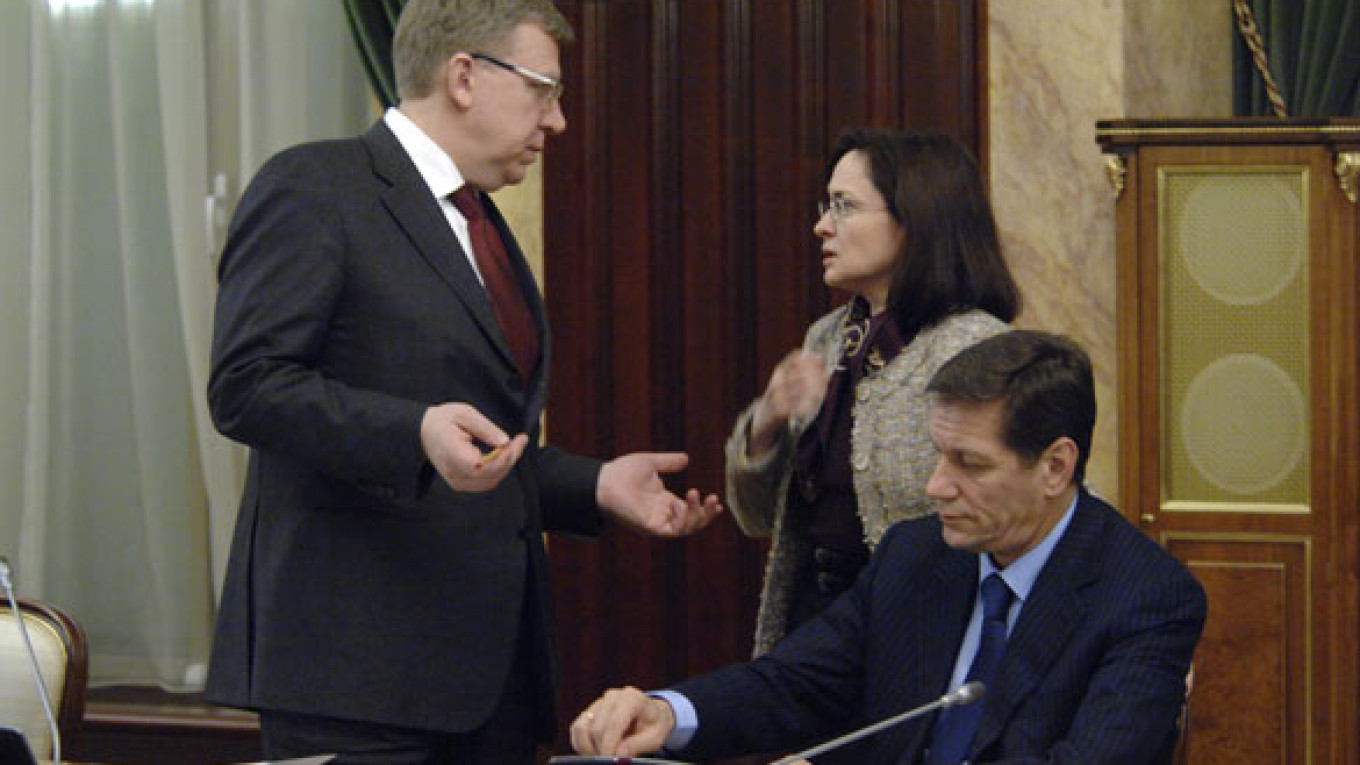Prime Minister Vladimir Putin on Thursday backed an oil price proposal that paves the way for greater federal spending next year when the presidential campaign kicks off.
A Presidium session that he chaired agreed to increase projected budget revenues next year by assuming that Russia's crude would sell for $75 a barrel on international markets, 25 percent higher than the previous prediction, Economic Development Minister Elvira Nabiullina said.
The move will enable the government to plan for additional revenue of 200 billion to 300 billion rubles, Anton Nikitin, an economist at investment bank Renaissance Capital, told The Moscow Times. That would equal at least $6.8 billion by the average rate of 29.3 rubles per dollar that the ministry is anticipating next year.
Under the previous assumption, made in the middle of the global recession last year, foreign consumers were to pay an average of $59 for a barrel of the Urals blend of crude. Given that price, the tentative federal budget for next year — which was adopted last year — would bring in 7.5 trillion rubles, or $216 billion by the dollar rate it envisaged.
Finance Minister Alexei Kudrin, a fiscal hawk who had insisted that the revised target price for crude shouldn't top $70 next year, said late Wednesday that the additional income could go toward reducing the projected 2011 budget deficit of 4 percent.
Nikitin described the prospect of a smaller budget deficit as "unlikely" in an election year, saying expenditures might grow instead. That would make Russia "much more vulnerable to global market conditions than it is now," he said separately in a note to investors.
The decision to back the bigger crude price outlook is the first time that Kudrin's conservative outlook has lost out to rosier estimates since Kudrin started as finance minister in 2000, Nikitin said.
The tentative budget for next year calls for 9.4 trillion rubles in spending, drawing the difference from the debt market and the Reserve Fund, the country's fiscal cushion.
Nabiullina declined to indicate how much the budget revenues would increase next year with the $75 oil. She said the ministry was able to win out over Kudrin's reservations by convincing Putin and the Presidium, a scaled-down Cabinet, that demand for oil next year would surpass supply because of a global economic upswing of 4 percent.
A ministry chart, released for the Presidium session, showed that the world would need 87.2 million barrels of oil every day next year, exceeding supply by 290,000 barrels.
"There are restrictions for increasing oil supply," she said after the meeting in response to a question from The Moscow Times.
As upbeat as they are, such expectations are more modest than forecasts by the leading international research agencies and many economic analysts, she said without elaborating.
Risks to the ministry's scenario include potentially higher exports of Iraqi oil and a decline in the prices for Russia's natural gas because of increasing production of shale gas in the United States, the ministry said in an overview of its latest economic outlook that the Cabinet published on its web site. A slower global economic recovery would also spoil the picture, the overview said.
The outlook includes the oil price prediction, which is key in calculating the budget, which is heavily dependent on oil revenues.
According to the ministry's forecasts, Gazprom's investment into its remote northern Yamal fields, as well as expansion of the auto industry will lead Russia's economic growth of 3.4 percent next year.
Also during the Presidium meeting, Putin ordered Russian Railways to develop a high-speed train system for Siberia like the Sapsan, which runs between Moscow and St. Petersburg.
He said similar high-speed trains should appear on other routes such as Moscow-Nizhny Novgorod and St. Petersburg-Helsinki.
A Message from The Moscow Times:
Dear readers,
We are facing unprecedented challenges. Russia's Prosecutor General's Office has designated The Moscow Times as an "undesirable" organization, criminalizing our work and putting our staff at risk of prosecution. This follows our earlier unjust labeling as a "foreign agent."
These actions are direct attempts to silence independent journalism in Russia. The authorities claim our work "discredits the decisions of the Russian leadership." We see things differently: we strive to provide accurate, unbiased reporting on Russia.
We, the journalists of The Moscow Times, refuse to be silenced. But to continue our work, we need your help.
Your support, no matter how small, makes a world of difference. If you can, please support us monthly starting from just $2. It's quick to set up, and every contribution makes a significant impact.
By supporting The Moscow Times, you're defending open, independent journalism in the face of repression. Thank you for standing with us.
Remind me later.


